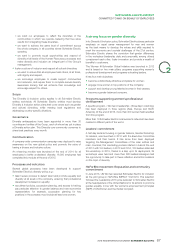APC 2015 Annual Report Download - page 93
Download and view the complete annual report
Please find page 93 of the 2015 APC annual report below. You can navigate through the pages in the report by either clicking on the pages listed below, or by using the keyword search tool below to find specific information within the annual report.
2015 REGISTRATION DOCUMENT SCHNEIDER ELECTRIC 91
SUSTAINABLE DEVELOPMENT
2
COMMITTED TO AND ON BEHALF OFEMPLOYEES
4.8 Social dialog and relations
Approach
Schneider Electric considers freedom of association and collective
bargaining as fundamental rights that must be respected
everywhere and therefore in its Principles of Responsibility commits
to complying with local laws in every country where it operates.
Updated in 2013, this common reference shared with all Schneider
Electric’s employees worldwide relies on the 10 principles of the
Global Compact, the corporate governance principles, the Guiding
Principles of the Organization for Economic Cooperation and
Development, the Universal Declaration of Human Rights and the
International Labor Standards.
The respect of trade union rights is expressly mentioned on
page10 of the Principles of Responsibility, through Principle three
of the Global Compact: «Businesses should uphold the freedom
of association and the effective recognition of the right to collective
bargaining». The «Principles of Responsibility» is communicated
on a global basis to all employees of Schneider Electric.
Social dialog is managed at country level by the HR leaders
with the employee representative bodies and unions, and at
transnational level with the European Works Council which covers
most of geographical Europe. Social dialogue is also taken into
consideration by our social reporting system, where local HR teams
report the presence of trade unions, works councils and Health and
Safety Committees every year.
While changing the corporate form of its parent company, Schneider
Electric SA, into a European Company («Société Européenne»),
Schneider Electric negotiated an agreement with employee
representatives of European countries about the involvement of
these countries’ employees in the company’s decision-making
processes, thus reaffi rming its commitment to promote social
dialog at international level.
Action plans in major localizations
European Works Council (EWC)
In 2015, Schneider Electric’s new European Works Council worked
for its fi rst full year. It was set up at the end of 2014 following an
agreement negotiated and agreed with employee representatives
from all European countries, in the framework of Schneider Electric
SA’s transformation into a European Company.
This agreement, which was approved by a vast majority of
negotiators, set out a new European Works Council with extended
powers and means, and introduced the participation of European
employee representatives at board of directors’ level. It replaced the
existing European Works Council.
The changes that were made to the European Works Council
signifi cantly enhanced the intensity and the impact of social
dialog at European Level. This European channel for dialog aims
at enabling the management to make more effi cient decisions by
giving employee representatives the opportunity to be informed of
such decisions and to understand their reasons, as well as to put
forward proposals to supplement or improve them.
It has also fostered the emergence of a strong identity, combining
different cultures and having the common aim of working towards
social and economic progress within the companies in the Group at
European level. The European Works Council covers all European
Economic Area countries (hence all EU member states) and
Switzerland, for a total of more than 50,000 employees.
In 2015, the European Works Councils met seven times, including
six Core Council Meetings and one plenary session. This allowed
an active social dialog at European level throughout the year, as
well as in-depth discussion on key topics. The June plenary session
hosted presentations and discussions on the company’s strategy
with ExCom members including whom Schneider Electric’s CEO.
One meeting took place in Schneider Electric’s new headquarters
in the Netherlands, where our solutions have been deployed and
were presented to the European employee representatives through
a most valuable « Tech Tour », along with a presentation of our
business and HR initiatives by our Country President and HR VP.
Group Works Council, France
Schneider Electric’s French Group Works Council is a forum for
economic, fi nancial and social dialog between senior management
and the representatives of employees from all French subsidiaries.
In 2015, the Group Works Council for France enhanced its
transversal information and understanding of business stakes and
strategy of Schneider Electric, through three meetings during the
year which dealt, among other topics, with Schneider Electric’s
Schneider is On company program, the merger of two industrial
entities in southeastern France, and the integration of Invensys.
For the same purposes, the Group Works Council also went
to Poland to visit our Bukowno plant and our shared services in
Warsaw, as well as one of our major manufacturing entities in
Grenoble.
Social dialog in the United States
In North America, regular communication takes place with both
union and non-union employees on key business topics and trends
affecting their jobs. Company offi cials meet on a semi-annual basis
with key international union leaders to inform them of competitive
issues impacting the company’s business, and to ensure alignment
with the company’s business strategies and challenges, on a local,
regional and global basis.
2015 was not a contract year for most of the union facilities in the
United States so the focus was on maintaining the relationship
with the union leadership. Meetings are held twice a year with
the international representatives of these unions to maintain
communications and to review business strategies. However, we
do have a small facility in Greensboro, NC that did have a successful
contract negotiation during the third quarter of 2015.
























